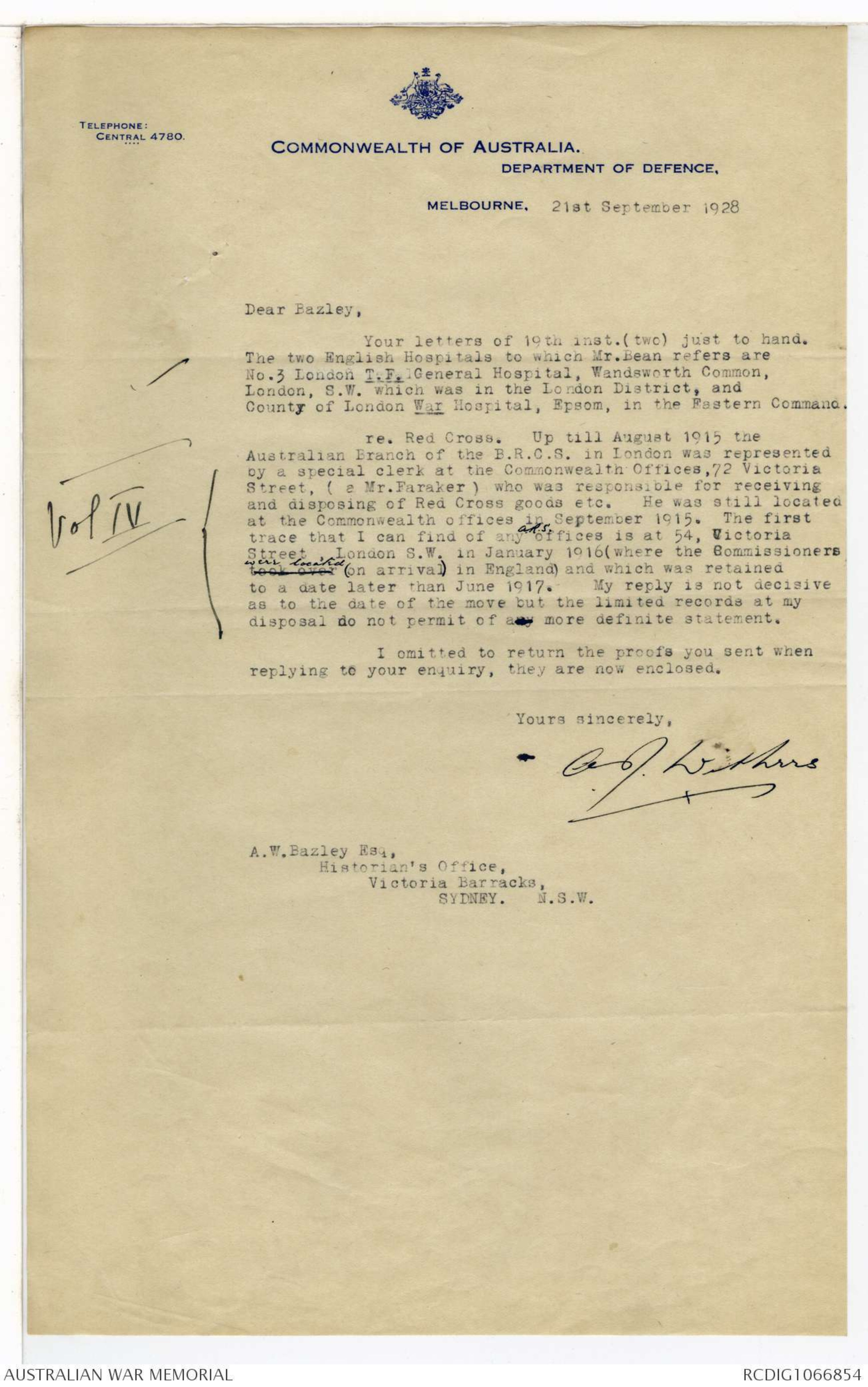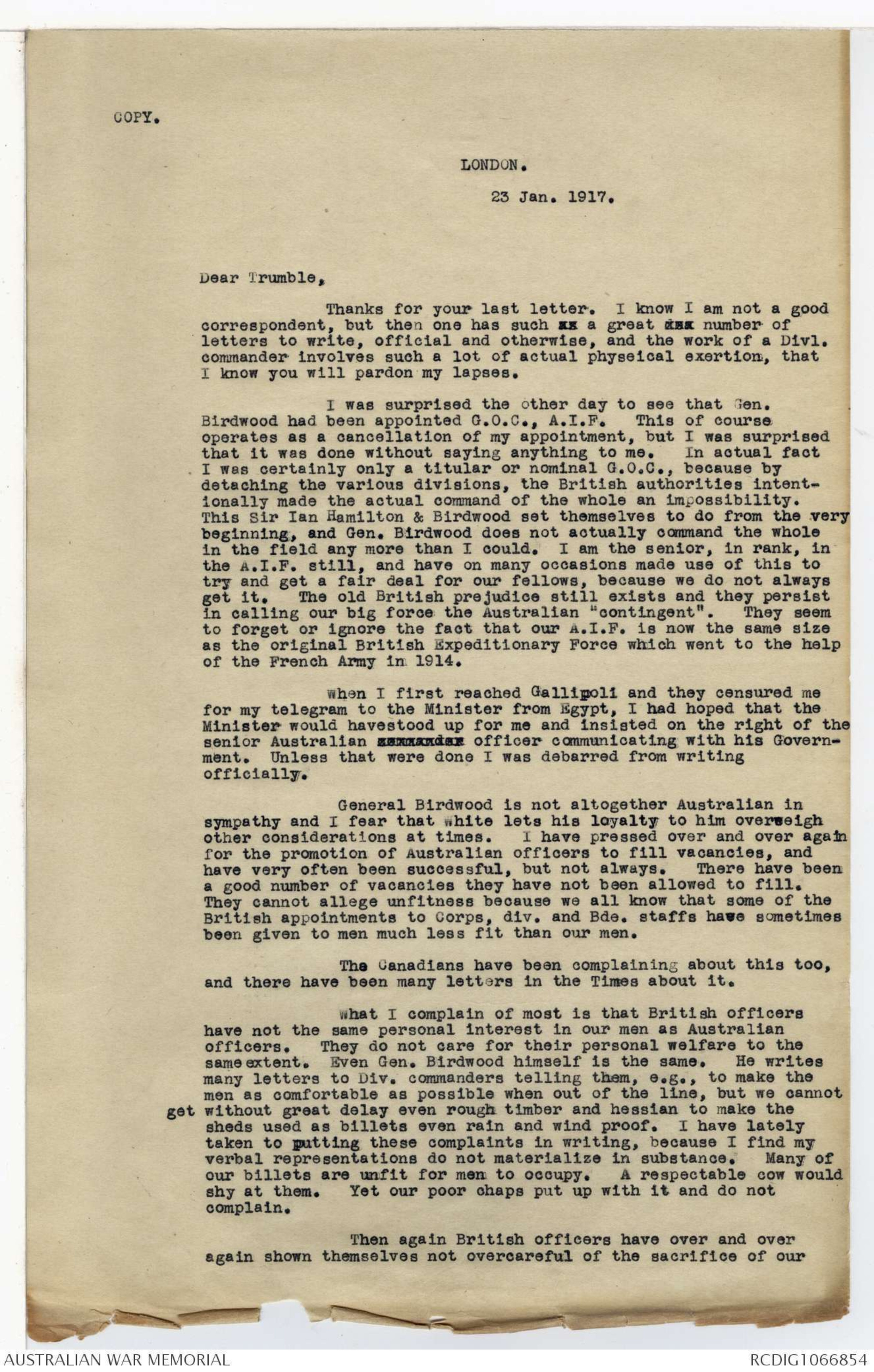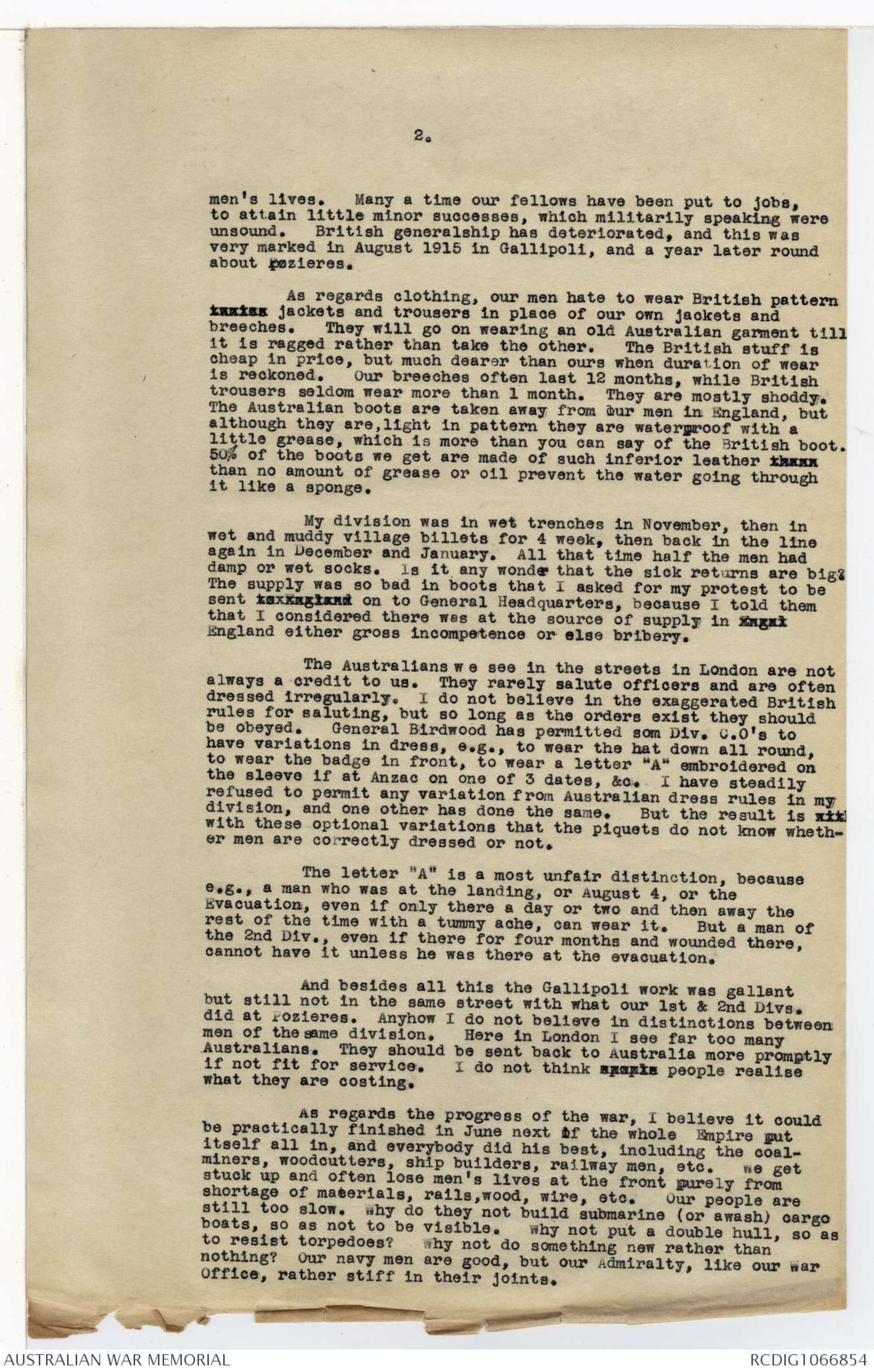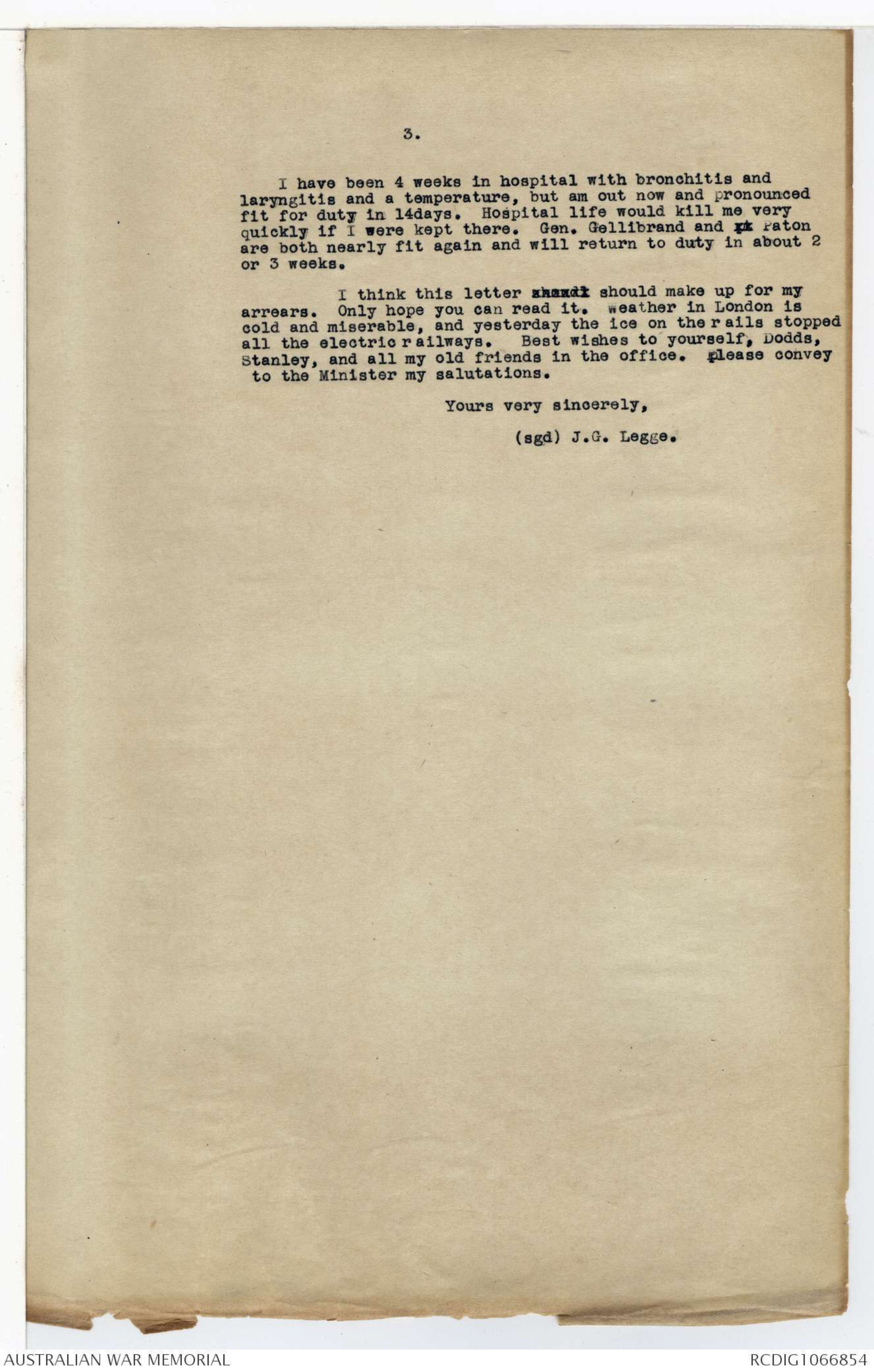Charles E W Bean, Diaries, AWM38 3DRL 606/255/1 - 1916 - 1937 - Part 17




.TELEPHONE:
CENTRAL 4780.
COMMONWEALTH OF AUSTRALIA.
DEPARTMENT OF DEFENCE.
MELBOURNE.
21st September 1928
Dear Bazley,
Your letters of 19th inst.(two) just to hand.
The two English Hospitals to which Mr.Bean refers are
No.3 London T.F. General Hospital, Wandsworth Common,
London. S.W. which was in the London District, and
County of London War Hospital, Epsom, in the Eastern Command.
[*Vol IV*] re. Red Cross. Up till August 1915 the
Australian Branch of the B.R.C.S. in London was represented
by a special clerk at the Commonwealth Offices,72 Victoria
Street, (a Mr.Faraker) who was responsible for receiving
and disposing of Red cross goods etc. He was still located
at the Commonwealth offices in September 1915. The first
trace that I can find of any [[?]] offices is at 54, Victoria
Street, London S.W. in January 1916(where the Commissionerstook over were located (on arrival) in England) and which was retained
to a date later than June 1917. My reply is not decisive
as to the date of the move but the limited records at my
disposal do not permit of any more definite statement.
I omitted to return the proofs you sent when
replying to your enquiry, they are now enclosed.
Yours sincerely,
[[C.J Withers?]]
A.W.Bazley Esq,
Historian's Office,
Victoria Barracks,
SYDNEY. N.S.W.
COPY.
LONDON.
23 Jan. 1917.
Dear Trumble,
Thanks for your last letter. I know I am not a good
correspondent, but then one has such xx a great xxx number of
letters to write, official and otherwise, and the work of a Divl.
commander involves such a lot of actual physical exertion, that
I know you will pardon my lapses.
I was surprised the other day to see that Gen.
Birdwood had been appointed G.O.C., A.I.F. This of course
operates as a cancellation of my appointment, but I was surprised
that it was done without saying anything to me. In actual fact
I was certainly only a titular or nominal G.O.C., because by
detaching the various divisions, the British authorities intentionally
made the actual command of the whole an impossibility.
This Sir Ian Hamilton & Birdwood set themselves to do from the very
beginning, and Gen. Birdwood does not actually command the whole
in the field any more than I could. I am the senior, in rank, in
the A.I.F. still, and have on many occasions made use of this to
try and get a fair deal for our fellows, because we do not always
get it. The old British prejudice still exists and they persist
in calling our big force the Australian "contingent". They seem
to forget or ignore the fact that our A.I.F. is now the same size
as the original British Expeditionary force which went to the help
of the French Army in 1914.
When I first reached Gallipoli and they censured me
for my telegram to the Minister from Egypt, I had hoped that the
Minister would havestood up for me and insisted on the right of the
senior Australian xxxxxxx officer communicating with his Government.
Unless that were done I was debarred from writing
officially.
General Birdwood is not altogether Australian in
sympathy and I fear that White lets his loyalty to him overweigh
other considerations at times. I have pressed over and over again
for the promotion of Australian officers to fill vacancies, and
have very often been successful, but not always. There have been
a good number of vacancies they have not been allowed to fill.
They cannot allege unfitness because we all know that some of the
British appointments to Corps, div. and Bde. staffs have sometimes
been given to men much less fit than our men.
The Canadians have been complaining about this too,
and there have been many letters in the Times about it.
What I complain of most is that British officers
have not the same personal interest in our men as Australian
officers. They do not care for their personal welfare to the
same extent. Even Gen. Birdwood himself is the same. He writes
many letters to Div. commanders telling them, e.g., to make the
men as comfortable as possible when out of the line, but we cannot
get without great delay even rough timber and hessian to make the
sheds used as billets even rain and wind proof. I have lately
taken to getting these complaints in writing, because I find my
verbal representations do not materialize in substance. Many of
our billets are unfit for men to occupy. A respectable cow would
shy at them. yet our poor chaps put up with it and do not
complain.
Then again British officers have over and over
again shown themselves not overcareful of the sacrifice of our
2.
men's lives. Many a time our fellows have been put to jobs,
to attain little minor successes, which militarily speaking were
unsound. British generalship has deteriorated, and this was
very marked in August 1916 in Gallipoli, and a year later round
about Pozieres.
As regards clothing, our men hate to wear British patternxxxxxx jackets and trousers in place of our own jackets and
breeches. They will go on wearing an old Australian garment till
it is ragged rather than take the other. The British stuff is
cheap in price, but much dearer than ours when duration of wear
is reckoned. Our breeches often last 12 months, while British
trousers seldom wear more than 1 month. They are mostly shoddy.
The Australian boots are taken away from our men in England, but
although they are,light in pattern they are waterproof with a
little grease, which is more than you can say of the British boot.
50% of the boots we get are made of such inferior leather xxxx
than no amount of grease or oil prevent the water going through
it like a sponge.
My division was in wet trenches in November, then in
wet and muddy village billets for 4 week, then back in the line
again in December and January. All that time half the men had
damp or wet socks. Is it any wonder that the sick returns are big?
The supply was so bad in boots that I asked for my protest to be
sent xxxxxxxx on to General Headquarters, because I told them
that I considered there was at the source of supply in xxxx
England either gross incompetence or else bribery.
The Australians w e see in the streets in London are not
always a credit to us. They rarely salute officers and are often
dressed irregularly. I do not believe in the exaggerated British
rules for saluting, but so long as the orders exist they should
be obeyed. General Birdwood has permitted some Div. C.O's to
have variations in dress, e.g. to wear the hat down all round,
to wear the badge in front, to wear a letter "A" embroidered on
the sleeve if at Anzac on one of 3 dates, &c. I have steadily
refused to permit any variation from Australian dress rules in my
division, and one other has done the same. But the result is xxx
with these optional variations that the picquets do not know whether
men are correctly dressed or not.
The letter "A" is a most unfair distinction, because
e.g., a man who was at the landing, or August 4, or the
Evacuation, even if only there a day or two and then away the
rest of the time with a tummy ache, can wear it. But a man of
the 2nd Div., even if there for four months and wounded there,
cannot have it unless he was there at the evacuation.
And besides all this the Gallipoli work was gallant
but still not in the same street with what our 1st & 2nd Divs.
did at Pozieres. Anyhow I do not believe in distinctions between
men of the same division. Here in London I see far too many
Australians. They should be sent back to Australia more promptly
if not fit for service. I do not think xxxx people realise
what they are costing.
As regards the progress of the war, I believe it could
be practically finished in June next if the whole Empire put
itself all in, and everybody did his best, including the coalminers,
woodcutters, ship builders, railway men, etc. We get
stuck up and often lose men's lives at the front purely from
shortage of materials, rails,wood, wire, etc. Our people are
still too slow. Why do they not build submarine (or awash) cargo
boats, so as not to be visible. Why not put a double hull, so as
to resist torpedoes? Why not do something new rather than
nothing? Our navy men are good, but our Admiralty, like our War
Office, rather stiff in their joints.
3.
I have been 4 weeks in hospital with bronchitis and
laryngitis and a temperature, but am out now and pronounced
fit for duty in 14days. Hospital life would kill me very
quickly if I were kept there. Gen. Gellibrand and xx Paton
are both nearly fit again and will return to duty in about 2
or 3 weeks.
I think this letter xxxxx should make up for my
arrears. Only hope you can read it. Weather in London is
cold and miserable, and yesterday the ice on the rails stopped
all the electric railways. Best wishes to yourself, Dodds,
Stanley, and all my old friends in the office. Please convey
to the Minister my salutations.
Yours very sincerely,
(sgd) J.G. Legge.
 Sam scott
Sam scottThis transcription item is now locked to you for editing. To release the lock either Save your changes or Cancel.
This lock will be automatically released after 60 minutes of inactivity.